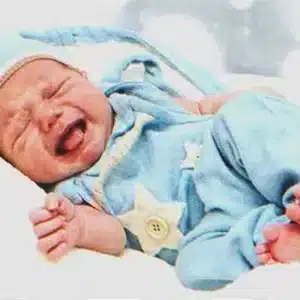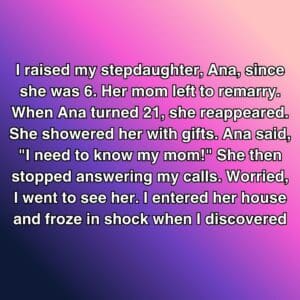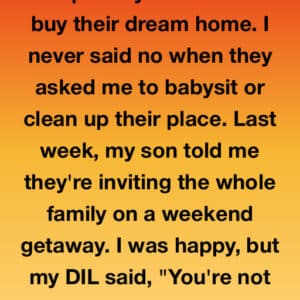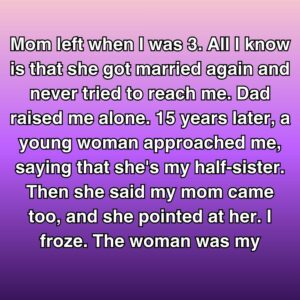They did a feelings test at preschool. That evening, Ana called with a voice that shook, and four words I’ll never forget: “We need to talk.” Our son had drawn the whole class in a storm of color—pink faces, blue shoes, yellow sun. Me? He’d filled me in with a thick, unbroken block of black. The psychologist’s report used words I wanted to throw across the room: tyrant, intimidating presence, fear response.
I asked Luca, very quietly, “Why, buddy?”
He swung his legs, thought for a beat, and said, “Because black means strong. You’re the strongest, Daddy.”
The floor shifted. Strong. Not scary. The distinction cut through me like clean air. But the damage was done—paperwork stamped and filed, my wife studying me like I’d been living in our house wearing a mask.
I sat on the edge of the couch. Luca sidled up and tugged my sleeve. “Did I make you sad, Daddy?”
I wrapped an arm around him. “No. I’m just thinking.”
Ana sat across from us with her hands clasped, waiting for the explosion that didn’t come. Instead, it all came out soft. I admitted what I hadn’t wanted to see: how work had swallowed me whole and left me smaller; how I’d become the guy who “corrects” instead of teaches, who organizes a four-year-old’s life like a warehouse manifest. I never hit, never screamed—but tone is a hammer too, and I’d swung it too often. I was raised by a man who thought hugs were currency you saved for funerals. I’d promised myself I’d do different, and somehow I’d slipped into that old armor anyway.
Ana nodded, wiped at her eyes, and went to bed early. Luca fell asleep with his head in my lap. I stared into the dark and realized black isn’t just fear. It can be weight, gravity, presence. It can be everything you are when you forget to be gentle.
The next morning I made pancakes. Burned the first batch, undercooked the second. Luca laughed so hard he hiccupped. Ana leaned in the doorway, watching us with a measuring gaze. I didn’t look away.
From there I didn’t make speeches; I changed rhythms. Instead of barked orders, I offered choices. Instead of pouncing on every mistake, I let some wobble and fall. I swapped “Don’t do that,” for “Want to try it this way?” The biggest shift was time—actual, undistracted time. We built a birdhouse and I glued two pieces backward. Luca declared it “cooler” and hung it anyway. We took evening walks to count dogs and name planets. On one route, a house still had a huge black skeleton swinging from a tree in March. “See?” he chirped. “Black can be funny.” I ruffled his hair. “You’re right.”
Ana saw it. Her shoulders lowered by degrees. One Saturday she snapped a picture of Luca and me asleep on the floor, sprawled in a bright sea of Legos, my arm draped over his chest like a seatbelt. No commentary, just a little smile as she set the phone down.
A few months later, the preschool asked for volunteers for Family Day. “Dads to talk about their jobs.” I almost said no—what four-year-old wants a rundown on freight lanes and delivery windows from a logistics manager? But Ana nudged me. “You should go. You’ve come a long way.”
I stood in front of a dozen wiggly kids and tried to translate scheduling into adventure. Luca sat front row, vibrating. Halfway through, he blurted, “Can I tell them about my dad?” The teacher nodded.
“He helps trucks get to the right place,” he said proudly. “And he makes pancakes. And he builds birdhouses even if they look funny.” He glanced at me, grinning. “He’s really strong, but not scary anymore.”
The room clapped. My throat tightened. For the first time in a long time, the picture of me that someone else held up looked like a person I wanted to be.
It wasn’t perfect after that. Bad days still arrived on schedule—days I came home with the warehouse in my body, days I wanted silence and not small hands pressing a book into my palm. But I apologized. I owned it. I said, “Even strong dads get tired. Love doesn’t.” And Luca, being four and then five, believed me.
One afternoon, I found a drawing folded into his pad. Everyone was colorful. And I was gold.
Ana kissed my cheek. “That’s who you are to him now,” she whispered. “Not scary. Not just strong. Special.”
If the story ended there, it would have been enough. But life is a little greedy with its plot twists.
One October morning, Ana fainted in the kitchen. Tests. Scans. More tests. An early-stage tumor. Operable, treatable, the doctor said, but the road would be long. On surgery day, Luca and I sat in the waiting room for hours. His hand clamped mine so tight his fingers went pale.
“Is Mommy gonna be okay?”
I went to one knee so we were eye to eye. The old me would have defaulted to steel. This time I reached for truth wrapped in steadiness. “Yes,” I said. “Because we’re going to be strong together. Just like we’ve practiced.”
The surgery went well. Recovery was slow. Our house changed shape around us: softer edges, longer pauses. Luca brought water with both hands like precious cargo. He read to her in his careful sounds. He attempted pancakes—burned them, proudly served them, and we ate every charred bite. We learned that being strong and being gentle are the same muscle, worked in different directions.
One night, with Ana dozing on the couch, Luca climbed into my lap. “Daddy?”
“Yeah, buddy?”
“Even when you were black,” he whispered, “you were still my hero.”
Grace, delivered in a small voice, rearranged the furniture in my chest.
By Christmas, Ana had her laugh back. We drove north to her parents’ place and woke to a yard washed in white. Luca built a snowman and tucked a paper tie under its pebble chin. “To look like Daddy at work,” he explained. Ana laughed until she cried, then cried until she laughed.
A few years later, I watched Luca walk a stage for his high school diploma. Taller now, voice deeper, the same wide-open heart. Afterward he hugged me and slipped an envelope into my hand. Inside was the old drawing—the one where I was a silhouette pressed heavy onto the page. Behind it, a note in his careful handwriting:
Thanks for turning the black into gold.
That night, with the house quiet and the yard silvered by moonlight, I stood at the window and held both pictures. I thought about all the ways men inherit shadows they never asked for—the voice, the stare, the armor—and how easily we mistake silence for leadership. I thought about a four-year-old who defined “black” as “strong” and a father who finally learned that strength has a second half.
Here’s what I know now: the darkest parts of us aren’t always villains. Sometimes they’re just the corners we’ve lived in too long. If we listen—really listen—to the small voices near our knees, we can learn how to step toward the light without blinding anyone.
If you’ve ever suspected you’re the black figure in someone’s drawing, it isn’t too late. You can change the story. One choice. One apology. One burnt pancake at a time.
And maybe, one day, you’ll look down and find that a kid with steady hands has colored you in gold.





